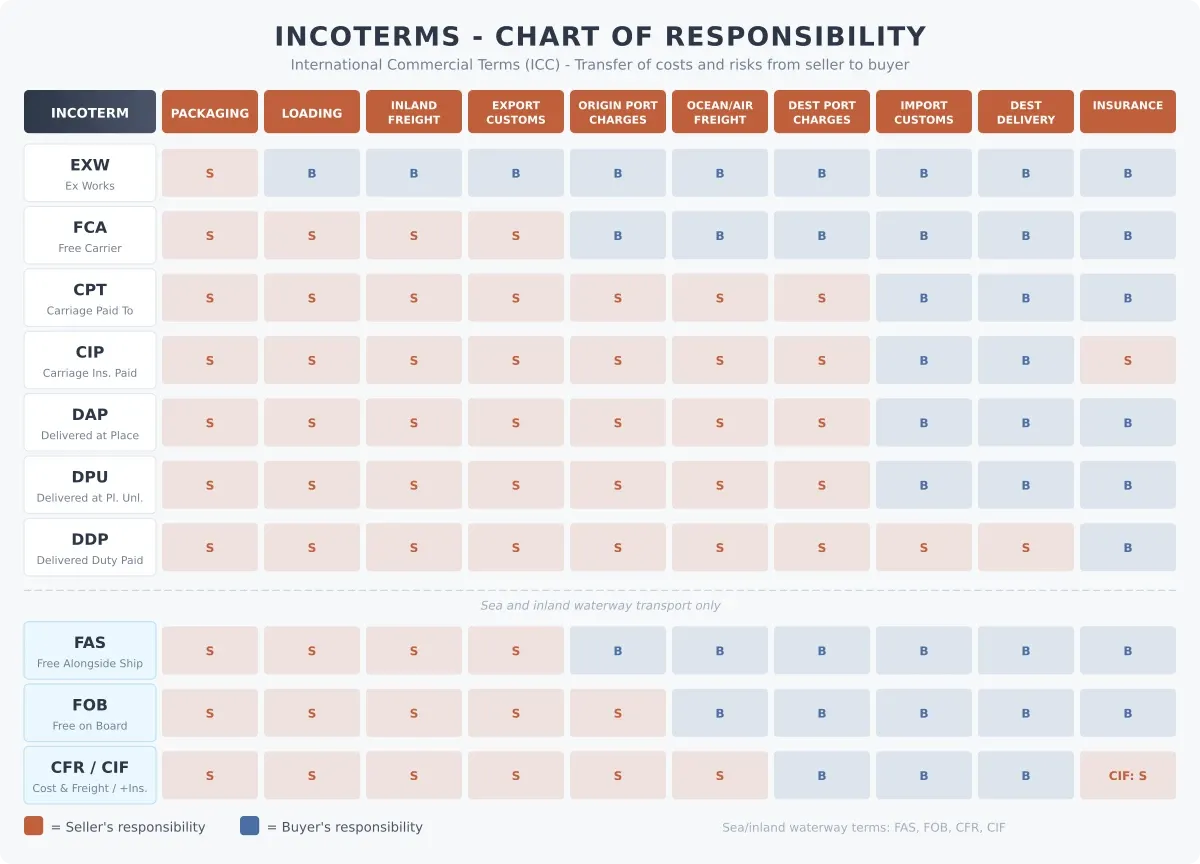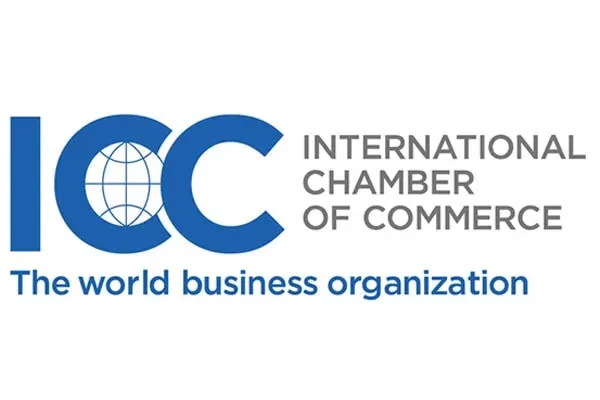Incoterms 2020: EXW, FOB, CIF
Incoterms Latest Edition 2020
Overview
 Incoterms chart of responsibility
Incoterms chart of responsibility
| Category | Terms | Transport Mode |
|---|---|---|
| E - Departure | EXW | Any |
| F - Main carriage unpaid | FCA, FAS, FOB | FCA: Any / FAS, FOB: Sea only |
| C - Main carriage paid | CPT, CIP, CFR, CIF | CPT, CIP: Any / CFR, CIF: Sea only |
| D - Arrival | DAP, DPU, DDP | Any |
Key Changes in 2020 Edition
| Change | Details |
|---|---|
| DAT → DPU | ”Delivered at Terminal” renamed to “Delivered at Place Unloaded” (delivery can be anywhere, not just terminals) |
| CIP insurance | Increased to Institute Cargo Clauses (A)-all risks coverage |
| CIF insurance | Unchanged-minimum coverage (C clauses) |
| FCA B/L option | Buyer can request carrier to issue on-board B/L to seller |
Incoterms define who pays for what and who bears the risk when goods move from seller to buyer. The critical distinction is that cost responsibility and risk transfer are separate; in C-terms, the seller pays for transport but risk transfers at origin, meaning the buyer bears risk during transit even though the seller arranged shipping.
C-Incoterms (Main Carriage Paid)
In C-terms, the seller pays for transport to destination but risk transfers at origin. This is counterintuitive-the buyer bears the risk during transit even though the seller arranged and paid for shipping.
| Term | Mode | Seller Pays For | Risk Transfers When |
|---|---|---|---|
| CFR | Sea only | Freight to destination port | Goods loaded on vessel |
| CIF | Sea only | Freight + insurance to destination port | Goods loaded on vessel |
| CPT | Any | Carriage to named destination | Goods handed to first carrier |
| CIP | Any | Carriage + insurance to named destination | Goods handed to first carrier |
CFR (Cost and Freight)
Sea/inland waterway only. Seller arranges and pays freight to destination port. Risk transfers when goods are loaded onto the vessel. No insurance required-buyer should arrange separately if needed.
CIF (Cost, Insurance, and Freight)
Sea/inland waterway only. Same as CFR, plus seller must provide marine insurance (minimum 110% of contract value, Institute Cargo Clauses C). Best for bulk/non-containerized cargo. For containers, consider CIP instead.
CPT (Carriage Paid To)
Any transport mode. Seller pays carriage to named destination. Risk transfers at first carrier handover. No insurance required-buyer should arrange if desired.
CIP (Carriage and Insurance Paid To)
Any transport mode. Same as CPT, plus seller must provide insurance covering Institute Cargo Clauses (A)-all risks at 110% contract value. This is the higher insurance standard compared to CIF.
C-Term Comparisons
| Comparison | Key Difference |
|---|---|
| CIF vs. CFR | CIF includes insurance, CFR does not |
| CIP vs. CPT | CIP includes insurance (A clauses), CPT does not |
| CIF/CFR vs. FOB | CIF/CFR: seller arranges freight. FOB: buyer arranges freight and has more control |
D-Incoterms (Arrival)
In D-terms, the seller assumes maximum responsibility-delivering goods to destination with all risks and costs until arrival.
| Term | Seller Delivers To | Seller Pays Import Duties? | Seller Unloads? |
|---|---|---|---|
| DAP | Named place (any location) | No | No |
| DPU | Named place (any location) | No | Yes |
| DDP | Named place (any location) | Yes | No |
DAP (Delivered at Place)
Any transport mode. Seller delivers to named destination, ready for unloading. Buyer handles import clearance, duties, and unloading. Most flexible D-term-delivery location can be warehouse, factory, or construction site.
DPU (Delivered at Place Unloaded)
Any transport mode. Same as DAP, but seller must also unload the goods. This is the only Incoterm requiring seller to unload. Consider unloading equipment needs when using this term.
DDP (Delivered Duty Paid)
Any transport mode. Maximum seller obligation-seller handles everything including import clearance, duties, and taxes. Buyer only unloads. Sellers need thorough knowledge of destination country’s import regulations.
Obsolete D-Terms
| Old Term | Removed In | Replaced By |
|---|---|---|
| DAT (Delivered at Terminal) | 2020 | DPU |
| DAF (Delivered at Frontier) | 2010 | DAP or DPU |
| DES (Delivered Ex Ship) | 2010 | DAP or DPU |
| DEQ (Delivered Ex Quay) | 2010 | DPU |
E-Incoterms (Departure)
EXW (Ex Works)
Any transport mode. Minimum seller obligation-seller only makes goods available at their premises. Buyer handles everything else: loading, export clearance, transport, import clearance.
| Responsibility | EXW | FOB (comparison) |
|---|---|---|
| Loading at seller’s | Buyer | Seller |
| Export clearance | Buyer | Seller |
| Transport to port | Buyer | Seller |
| Loading on vessel | Buyer | Seller |
| Sea freight | Buyer | Buyer |
| Import clearance | Buyer | Buyer |
F-Incoterms (Main Carriage Unpaid)
In F-terms, the buyer arranges and pays for main carriage. The seller delivers to a carrier or vessel, then buyer takes over.
| Term | Mode | Seller Delivers To | Risk Transfers When |
|---|---|---|---|
| FCA | Any | Carrier at named place | Goods handed to carrier |
| FAS | Sea only | Alongside vessel at port | Goods placed alongside ship |
| FOB | Sea only | On board vessel at port | Goods loaded on vessel |
FCA (Free Carrier)
Any transport mode. Seller delivers goods (export cleared) to buyer’s carrier at named location. If at seller’s premises, seller loads; if elsewhere, seller is not responsible for unloading.
2020 update: Buyer can instruct carrier to issue on-board B/L to seller-important for Letter of Credit transactions.
FAS (Free Alongside Ship)
Sea/inland waterway only. Seller delivers goods alongside the vessel at port. Buyer arranges loading onto ship and all onward transport. Best for bulk cargo (oil, grain, coal) where buyer controls loading.
FOB (Free On Board)
Sea/inland waterway only. Seller loads goods onto the vessel at port. Risk transfers when goods are on board. The most commonly used sea freight term-buyer controls freight from loading port.
Summary: All Incoterms 2020
| Incoterm | Seller’s Main Obligations | Buyer’s Main Obligations |
|---|---|---|
| EXW | Make goods available at premises | All transport, export/import clearance |
| FCA | Deliver to carrier, export clearance | Main carriage, import clearance |
| FAS | Deliver alongside ship, export clearance | Loading, main carriage, import clearance |
| FOB | Load on vessel, export clearance | Main carriage, import clearance |
| CFR | Freight to port, export clearance | Unloading, import clearance (risk from loading) |
| CIF | Freight + insurance to port, export clearance | Unloading, import clearance (risk from loading) |
| CPT | Carriage to destination, export clearance | Import clearance (risk from first carrier) |
| CIP | Carriage + insurance to destination, export clearance | Import clearance (risk from first carrier) |
| DAP | All costs/risks to destination (except import) | Unloading, import clearance, duties |
| DPU | All costs/risks including unloading | Import clearance, duties |
| DDP | All costs/risks including import duties | Unloading only |
The International Chamber of Commerce (ICC)

The ICC publishes Incoterms and other key trade standards. Established 1919, it’s the world’s largest business organization with 45+ million members in 100+ countries.
Key ICC publications for trade:
| Publication | Purpose |
|---|---|
| Incoterms® | Delivery terms for sales contracts |
| UCP 600 | Rules for Letters of Credit |
| URDG 758 | Rules for demand guarantees |
| ICC Arbitration | International dispute resolution |
Leave a Comment
Have a question or feedback? Send us a message.
Previous Comments
Very help article. All export import condition here.
Thank you for your appreciated comment. Should you need further information on some specific topics, kindly send us an email to [email protected]. To submit an RFQ for piping materials, please visit this page: https://projectmaterials.com/submit-rfq-mto. Best regards, Projectmaterials
You explained it very well.